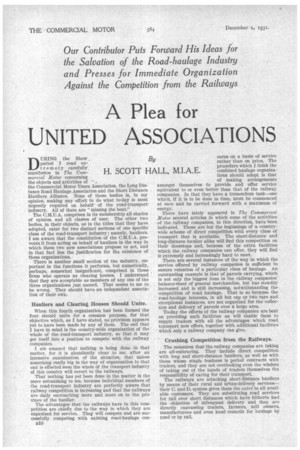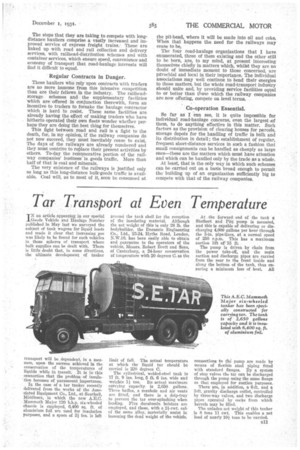A Plea for UNITED ASSOCIATIONS
Page 44

Page 45

If you've noticed an error in this article please click here to report it so we can fix it.
Our Contributor Puts Forward His Ideas for the Salvation of the Road-haulage Industry and Presses for Immediate Organization Against the Competition from the Railways
H. SCOTT HALL, M.I.A.E.
DURING the Show By period I read ex
tremely carefully, manifestos in The Commercial Motor concerning the objects and activities of the Commercial Motor Users Association, the Long Distance Road Haulage Association and the Short Distance Hauliers Alliance. None of these bodies is, in my opinion, making any effort to do what to-day is most urgently required on behalf of the road-transport' industry. All of them are "missing the boat."
The C.M.U.A. comprises in its membership all shades of opinion and all classes of user. The other two bodies, in their objects, as in the titles that they have adopted, cater for two distinct sections of one specific class of the road-transport industry ; namely, hauliers. I am aware that the constitution of the C.M.U.A. prevents it from acting on behalf of hauliers in the way in which these two new associations propose to act, and in that fact lies the justification for the existence of these organizations.
There is another small section of the industry, important in the functions it performs, but numerically, perhaps, somewhat insignificant, comprised in those firms who operate as clearing houses. I understand that they are acceptable as members of any one of the three organizations just named. That seems to me to be wrong. They should have an independent association of their own.
H. SCOTT HALL, M.I.A.E.
Hauliers and Clearing Houses Should Unite.
When this fourth organization has been formed the four should unite for a common purpose, for that objective which, as I have stated, no provision appears yet to have been made by any of them. The end that I have in mind is the country-wide organization of the whole of the road-transport industry, so that it may get itself into a position to compete with the railway companies.
I am amazed that nothing is being done in that matter, for it is abundantly clear to me, after an intensive examination of the situation, that unless something really big in the way of organization to that end is effected soon the whole of the transport industry of this country will revert to the railways.
That nothing has yet been done in the matter Is the more astonishing to me, because individual members of the road-transport industry are perfectly aware that railway competition is increasing and that the railways are daily encroaching more and more on to the province of the haulier.
The advantages that the railways have in this competition are chiefly clue to the way in which they are organized for service. They will compete and are successfully competing with existing road-haulage con B10 cerias on a basis of service rather than on price. The procedure which I think the combined haulage organizations should adopt is that of making arrangements amongst themselves to provide and offer service equivalent to or even better than that of the railway companies. In that they have a tremendous task—one which, if it is to be done in time, must be commenced at once and be carried forward with a maximum of energy.
There have lately appeared in The Commeresal Motor several articles in which some of the activities of the railway companies, in this direction, have been indicated. Those are but the beginnings of a countrywide scheme of direct competition with every class of transport that is available. The short-distance and long-distance haulier alike will find this competition on their doorsteps and, because of the extra facilities which the railway companies can offer, they will find it extremely and increasingly hard to meet.
There are several instances of the way in which the service offered by railway companies is sufficient to ensure retention of a particular class of haulage. An outstanding example is that of parcels carrying, which is not only the biggest item in the railway companies' balance-sheet of general merchandise, but has steadily increased and is still increasing, notwithstanding the competition of road haulage. That is so because the road-haulage interests, in all but one or two rare and exceptional instances, are not organized for the collection and delivery of parcels over a large area.
To-day the efforts of the railway companies are bent on providing such facilities as will enable them to supply traders with all the advantages which road transport now offers, together with additional facilities which only a railway company can give.
Crushing Competition from the Railways.
The measures that the railway companies are taking are all-embracing. They include direct competition with long and short-distance hauliers, as well as with those whose staple business is period contracts with traders, and they are not overlooking even the wisdom of taking out of the hands of traders themselves the responsibility of caring for their transport.
The railways are attacking short-distance hauliers by means of their rural and urban-delivery services— their C. and D. system gives them the entre to all available customers. They are substituting road services for rail over short distances which have hitherto had the objection of infrequent delivery and they are directly canvassing traders, farmers, mill owners, manufacturers and even local councils for haulage by road or by rail.
The steps that they are taking to compete with longdistance hauliers comprise a vastly increased and improved service of express freight trains.. These are linked up with road and rail collection and delivery services, with railhead-distribution schemes and with container services, which ensure speed, convenience and economy of transport that road-haulage interests will find it difficult to equal.
Regular Contracts in Danger.
Those hauliers who rely upon contracts with traders are no more immune from this intensive competition than are their fellows in the industry. The railheadstorage schemes and the supplementary facilities which are offered in conjunction therewith, form an incentive to traders to forsake the haulage contractor which is hard •to resist. These same facilities are already having the effect of making traders who have hitherto operated their own fleets wonder whether perhaps they are doing the best thing for themselves.
This fight between road and rail is a fight to the death, for, in my opinion, if the railway companies do not now succeed, they must inevitably cease to exist. The days of the railways are already numbered and they must contrive to replace their present activities by others. To-day the remunerative portion of the railway companies' business 'is goods traffic. More than half of that is coal and minerals.
The very existence of the railways is justified only so long as this long-distance bulk-goods traffic is available. Coal will, as to most of it, soon be consumed at the pit-head, where it will be made into oil and coke. When that happens the need for the railways may cease to be,
The four road-haulage organizations that I have enumerated, three of them existing and the other still to be born, are, to my mind, at present interesting themselv-es chiefly in matters which, whilst they are no doubt of immediate moment to those concerned, are parochial and local in their importance. The individual associations may well continue to bend their energies to those matters, but the whole road-transport industry should unite and, by providing service facilities equal to or better than those which the railway companies are now offering, compete on level terms.
Co-operation Essential.
So far as I can see, it is quite impossible for individual road-haulage concerns, even the largest of them, to do anything effective in this matter. Such factors as the provision of clearing houses for parcels, storage depots for the handling of traffic in bulk and its distribution in detail ; the establishment of regular, frequent short-distance services in such a fashion that small consignments can be handled as cheaply as large ones—these are the matters which must have attention and which can be handled only by the trade as a whole.
At least, that is the only way in which such schemes can be carried out on a basis broad enough to permit the building up of an organization sufficiently big to compete with that of the railway companies.
























































































